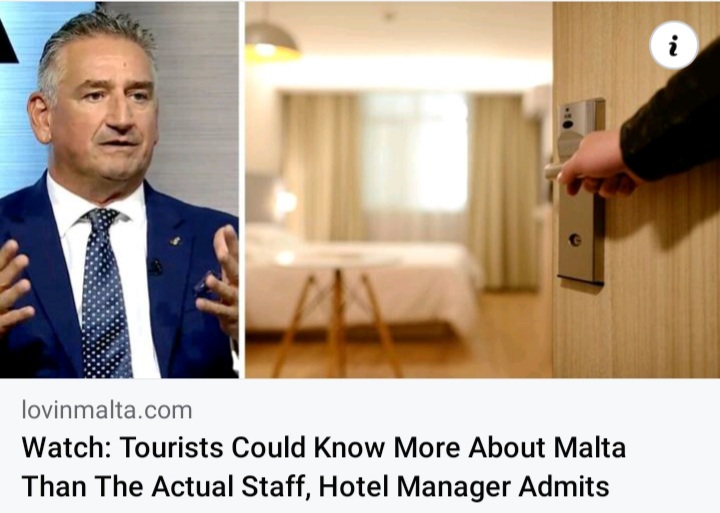Reporting what Norbert Grixti, the general manager of the Grand Hotel Excelsior, said on a discussion on ONE TV’s Awla, Lovin Malta stated that Grixti is dismayed “at the lack of Maltese workers within the hospitality industry and said it is diluting tourists’ experiences.”
On Awla, Grixti said:
“When I started out in the industry, we would speak to guests and tell them that thanks to the Maltese, the Knights won the Great Siege and the English won the Second World War, and they used to enjoy it. Nowadays, you realize you were giving them a particular experience.”
“Nowadays an excited guest could ask a bartender about Mdina or Valletta and it would turn out that he might know even more than the bartender, who might be Serbian.”
Whose fault is this? Let us assume that the majority of Maltese people do not find the hotel industry very exciting to work in. What did the hotel industry do to attract the Maltese? Did it offer good working conditions and an excellent hourly rate, considering that this industry requires long hours, shifts, and even working on public holidays and festivities?
Isn’t Malta lost? Don’t most tourists come and go without even encountering any Maltese people during their stay? The taxi driver who picks them up from the airport is foreign. Most probably, it is also the case if they take the bus. Once in the hotel, they are greeted by a foreign receptionist. The waiter is also foreign. The maid is also foreign. So is the barman. The shop assistant is also foreign. And if they happen to go to the beach, the sunbed attendant is also foreign.
Needless to say, all these foreigners won’t talk to them in Maltese. Some of them have a very basic grasp of the English language.
Shouldn’t the hospitality industry admit that it employs foreigners because it does not offer attractive packages to attract Maltese workers? Shouldn’t the hospitality industry admit that foreigners accept such jobs because, for them, anything will do, especially if they come from poor countries? Shouldn’t the hospitality industry admit that it pays foreigners peanut salaries, which they accept because, again, for them anything will do, but which the Maltese do not because they understand that it is not worthwhile?
Isn’t the context that Grixti highlighted what one gets when one pays less than the market rate? Good, educated, patriotic, and knowledgeable staff costs money, but it also brings revenue.
What kind of Maltese experience are tourists getting?
Shouldn’t the hospitality industry highlight and admit, especially when it comes to hotels, that significant financial and other rewards are primarily reserved for those at the top? Why hadn’t the hospitality industry, in those days when the workers were Maltese, offered a fulfilling and satisfactory financial package to those who coped with long hours while giving them a work-life balance that was attainable and sustainable in the long run?
Did it ever collect data to understand why Maltese workers were leaving the industry?
The hospitality industry is shooting in its leg. There will come a time when all the decisions taken will backfire. It needs to act now, before it is too late.

